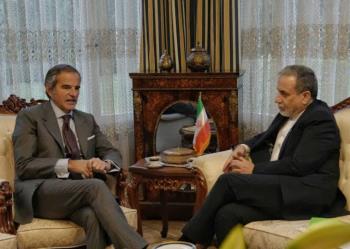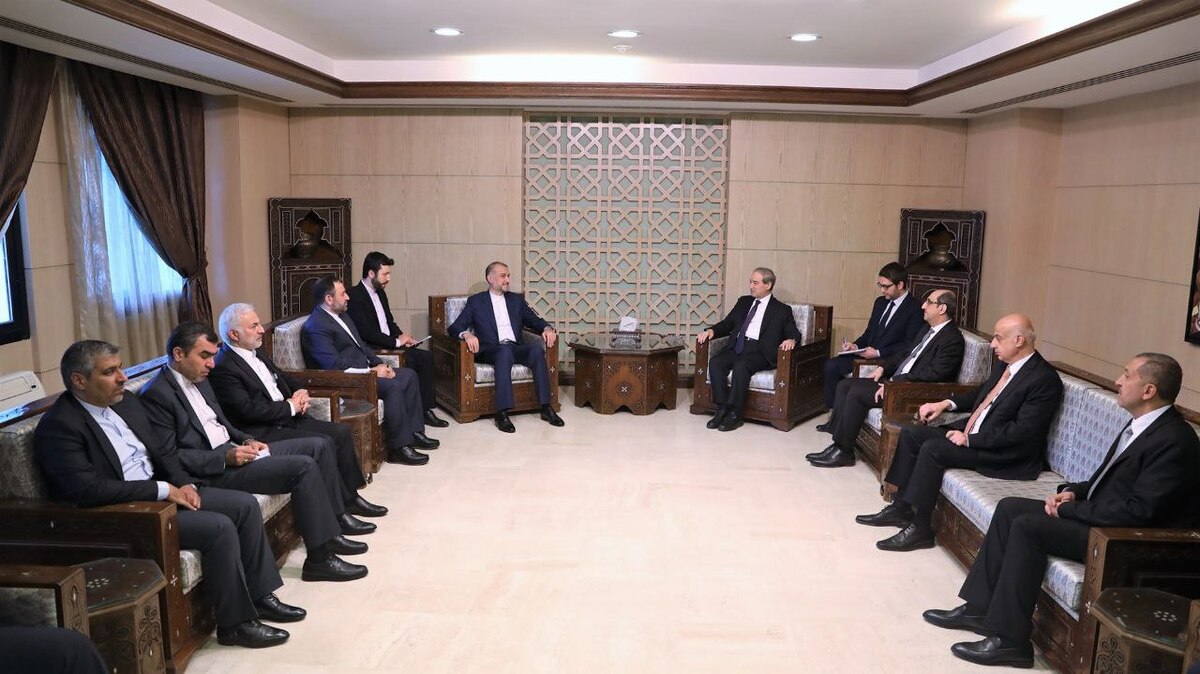Alwaght- While the Israeli regime with its attack on the Iranian consulate in Damascus has brought the conflict with the Axis of Resistance to a boiling point, the political activism of Iran beside operational moves are under the focus of the media and analysts that seek to find signs to make predictions about Tehran and Resistance camp’s strategic decision in the current conditions.
In the meantime, Iran's Foreign Minister Hussein Amir-Abdollahian, who since the beginning of the Israeli aggression on Gaza made several trips to regional countries in quest for end to the genocide in the coastal enclave, in recent days started a new regional tour.
According to the Iranian Foreign Ministry’s statement, the FM started his tour with Oman as his first stop on Sunday, heading a political and parliamentary delegation. According to the statement, he discussed with his Omani counterpart Badr bin Hamad Al-Busaidi bilateral cooperation, expansion of relations, and implementation of the previously-reached agreements between the heads of the two counties.
In their meeting, referring to the attack on the Iranian consulate, the two sides emphasized the need to respond to the Israeli regime for its repeated and clear violation of all international laws and conventions. The two sides also highlighted their common commitment to promote stability and peace in the region and the world based on the principles of justice, respect for the sovereignty of countries, and resolving disputes by peaceful and diplomatic means.
Amir-Abdollahian presented a report on his trip to Oman and his consultation with Omani authorities in an X post, saying that "during the trip to Oman, I met with the Foreign Minister of the Sultanate of Oman and Mohammad Abdel Salam, the head of the negotiating team of the National Salvation Government of Yemen....The process of developing the bilateral relations between the two countries and the agreements between the heads of Iran and Oman was examined... There was a discussion about the continuation of the Sultan of Oman's initiative to lift the sanctions. We also discussed the latest developments in the region, including the continuation of combined war crimes by the Zionists against the Palestinians and the need to take deterrent decisions."
The trip comes a week after the Israeli warplanes struck the Iranian embassy's consular section in the Syrian capital. Tehran vowed revenge to the martyrdom of seven of IRGC generals and officers during the the attack. According to the military sources, the Iranian response is certain, and it is the matter of time and place.
Observers suggest that Iranian response will put into motion new developments in the region, and that is why, Amir-Abdollahian's tour is of great significance at the present time.
Oman and possible exchange of messages between Tehran and Washington
Amir-Abdollahian's visit to Muscat comes as over the past week indirect Iranian-American messages have been traded, and Oman has been the main mediator in this process. For this reason, Oman has been chosen as the first station of Amir-Abdollahian's tour, a country that over the past decade has mediated talks between Tehran and Washington to reach a nuclear deal.
Oman in recent years has pushed for a common ground between the US and Iran many times with its mediations. In the current tense conditions, there are speculations about Muscat mediatng contacts between the two countries.
Oman, as one of the important players in the region, has played an important role in the ceasefire negotiations in Gaza, and now that the war has flared up in the region, it is trying to ease the conflict. Therefore, some experts do not rule out Iran and the US exchangng messages via Oman.
Since the Israeli regime and its Western backers are expecting a resolute Iranian response to the consulate assault, the White House seems optimistic about mediation of Muscat to defuse the burgeoning tensions.
In recent years, Iran has sent important messages to the American side through Oman and Qatar channels to avoid the risk of direct confrontation. Tehran has always had a strong position against the military adventures of the US and the Israeli regime, and this time that there is a possibility of a direct confrontation between Tehran and Tel Aviv, countries like Oman can play an important role to smooth things over.
There is no doubt that in the coming days a military response will be given to the Israeli aggression, and so Amir-Abdollahian would possibly tell the Americans through Muscat that they should stand aside because the Islamic Republic has proven that it is resolute in defending its national sovereignty and interests. Having in mind that Netanyahu, as analysts agree, seeks to bring the US face to face with Iran through inflaming a regional war, the Islamic Republic intends to remind the White House of the consequences of any adventures and to tell them to avoid being played by the Israeli hardliners.
From another aspect, the American officials have come to the notion that they may unwantedly be dragged to confrontation with Resistance camp, as following the UN Security Council meeting on the Israeli attack on the Iranian consulate, the State Department claimed that the US was unaware of the attack and so did not take part in it and asked Iran not to attack its bases in the region.
Also, since the ceasefire negotiations between Hamas and the Israeli delegation are underway in Cairo, odds are that the Islamic Republic sent the message to the American side through Oman that the war in Gaza should be ended as soon as possible.
Indeed, Yemen front was one of the focal points of the conversation between Iranian foreign policy chief and his Omani counterpart, and the meeting with Mohammad Abdel Salam bears witness to this claim. It should be noted that the operations of Yemen's Ansarullah in the Red Sea against Israeli ships in recent months has become the biggest concern of the leaders of Tel Aviv and Washington, and according to media reports, there have been several messages on this issue between Iran and the US through communication channels to defuse the situation.
Over the past three months, the US, in association with Britain, has launched dozens of aitrikes on Yemen in defense of the Israeli interests to degrade Ansarullah’s capability to operate in the Red Sea and beyond. But these attacks have delivered the reverse as they not only have failed to stop Yemeni attacks, but also made this waterway even more vulnerable than before. Ansarullah leaders have several times said that they will end their Red Sea operations should Gaza war stops, but instead of pressing Tel Aviv for a truce, Washington promoted a new war front by forming a naval coalition.
Coordinating the plans in Damascus
After Oman, Amir-Abdollahian visited Damascus to meet senior Syrian officials. According to media outlets, the two sides will discuss bilateral cooperation, the agreements reached between heads of state, and regional cases like Gaza war.
Because the attack was carried out on the Syrian soil, Tehran tries to coordinate its military and political stances with Damascus. Some observers say the Iranian response to the Israeli attack will be given from Syria or Lebanon’s soil, and it is not unlikely that Syrian government will be informed of details of Iranian military operation.
On Friday, CBS News reported that intelligence obtained by the US and Israel indicated that Iran is preparing a retaliation, possibly using surveillance drones and cruise missiles. Some sources also announced that Iran has imported a number of military equipment and drones to Deir Ez-Zor province in eastern Syria, which will most likely be used in the anticipated operation against the Israeli regime.
In recent decade, Iran and Syria have countered the Israeli adventures in the region, and now that Tel Aviv has crossed the red lines, response to it is a certainty. Meanwhile, it seems that Iran's retaliation will be combined and conducted with participation of all branches of the Axis of Resistance, and Syria will be part of this operation. Therefore, Amir-Abdollahian's Damascus visit comes to coordinate stances of the two states and prepare to make Tel Aviv accountable since it has violated Syrian sovereignty and international conventions.



























